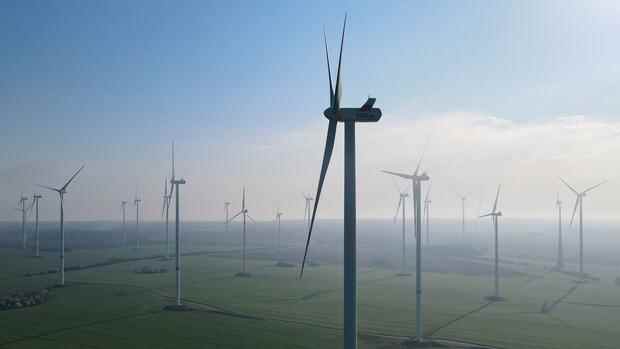Since 2000, Germany has set the world’s fastest pace in expanding renewable energies.
(Photo: dpa)
At the climate strike demonstration in Berlin on September 24, 2021, Greta Thunberg declared: “Germany is one of the biggest climate villains.” This statement is completely inappropriate.
The fact is: while global CO2 emissions have increased by 50 percent in the past thirty years, Germany has been able to meet its greenhouse gas reduction target of 40 percent compared to 1990.
It is true that the CO2 emissions per capita in Germany, at 7.3 tonnes, are well above the world average of 4.1 tonnes in 2020. However, it must be taken into account that Germany has a high economic output and, as an export country, also for customers abroad produced.
CO2 emissions per unit of gross domestic product in Germany are less than half the global average. Relocating production from Germany to other countries would not be associated with a global reduction in CO2 emissions. The opposite is more likely.
Top jobs of the day
Find the best jobs now and
be notified by email.
Since 2000, Germany has set the world’s fastest pace in expanding renewable energies. Since then, their share of electricity generation has increased sevenfold to 44 percent in 2020.
High electricity prices in Germany
In 2000, Germany ranked 15th in the G20 group – measured by the percentage contribution of renewable energies to electricity generation. Last year, renewable energies within the G20 group only achieved higher shares in Brazil and Canada than in Germany. There the plentifully available hydropower is the most important renewable energy source, in Germany it is wind and solar energy as well as biomass.
The author is a member of the Studies Committee of the World Energy Council, London, and Chairman of the Energy for Germany editorial group of the World Energy Council – Germany, Berlin.
(Photo: Hans-Wilhelm Schiffer)
The expansion of renewable energies that took place in Germany was financed by the consumer through the EEG levy on the electricity price. The subsidy contributions made by electricity consumers in the period from 2000 to 2020 totaled around 244 billion euros.
A positive consequence was a massive reduction in the prices for wind and especially for solar systems. This has greatly favored the entry of other countries into these technologies. One consequence, however, is that in Germany, especially for private consumers – largely due to the EEG surcharge – the world’s highest electricity prices apply.
This is counterproductive from the point of view of climate protection. The increased provision of electricity through the accelerated expansion of renewable energies, for example for the production of hydrogen, is the best guarantee for continued success in decarbonization.
Increased CO2 pricing
The key to the trend reversal in the global development of greenhouse gas emissions that is necessary to meet the Paris climate targets lies in increased pricing of CO2.
So far there has been significant direct and indirect pricing of CO2 – via the taxation of energy products or CO2 or via emissions trading systems – mainly in Europe.
Outside Europe, the pollution associated with CO2 emissions is usually still very manageable. In a number of regions of the world, such as the Middle East or Russia, even consumer prices apply for energy products that are below the opportunity costs, i.e. the waiver costs – measured against the prices achievable on the world market. Such subsidization, i.e. negative CO2 pricing, counteracts a reduction in energy and CO2 intensity.
Raising the level of ambition for climate protection is indispensable. In Germany and the EU, the greenhouse gas reduction targets have recently been tightened significantly. Greenhouse gas emissions are to be reduced by 65 percent in Germany by 2030 and by 55 percent in the EU compared to 1990. Germany aims to be climate neutral by 2045.
However, the EU-27 only accounts for eight percent of global CO2 emissions. In addition to an ambitious climate policy in Germany and the EU, it is therefore crucial that other countries follow suit.
Ideologies of renunciation are not a suitable approach for this. This would hardly induce the economically emerging countries of Asia to follow the European example. Rather, it is necessary to prove that prosperity and climate protection are not mutually exclusive.
A strengthening of international cooperation is essential for this. The most important step would be an agreement on a gradual global harmonization of CO2 pricing. This would create the main incentives through market forces to promote climate-friendly technologies around the world. Economic shrinkage, on the other hand, is not a sustainable strategy to achieve the necessary emission reductions.
More: “Climate neutrality cannot be brought about” – experts call for a radical change in direction in climate policy.

